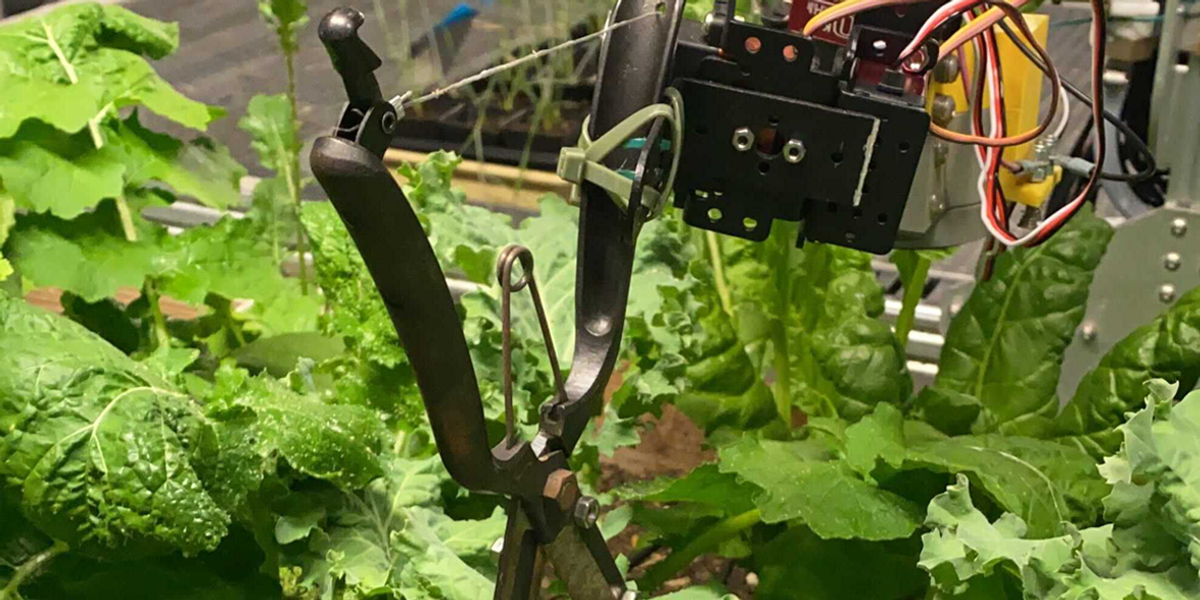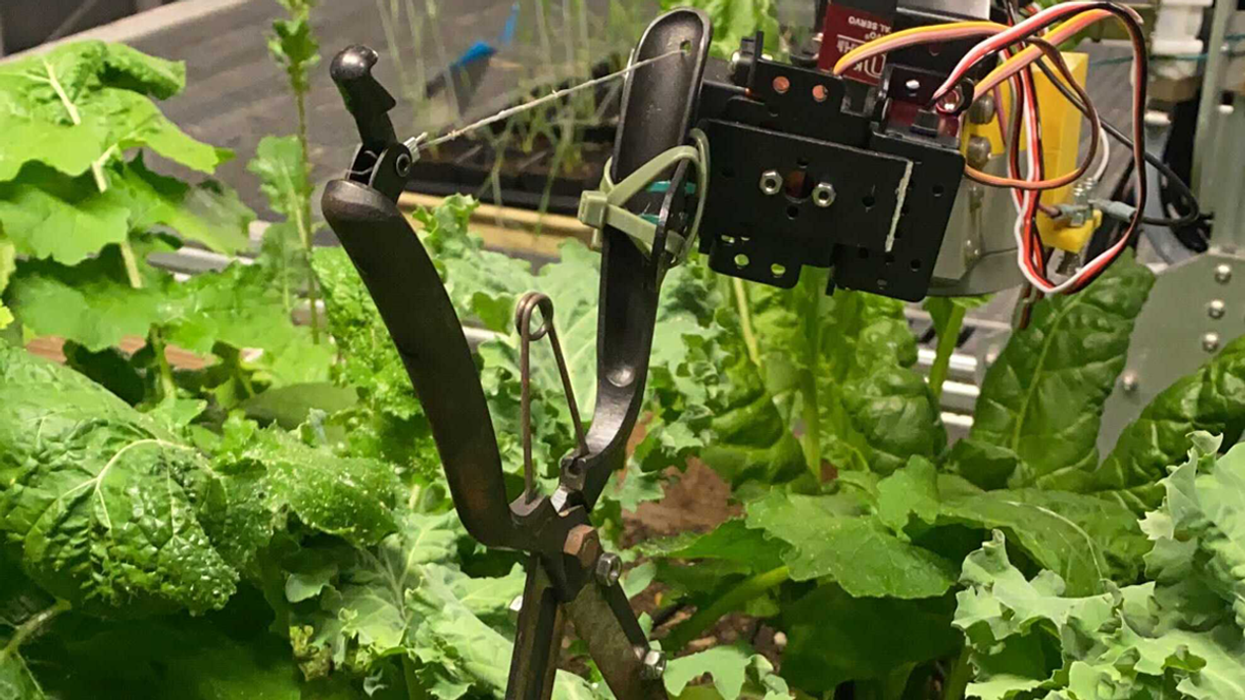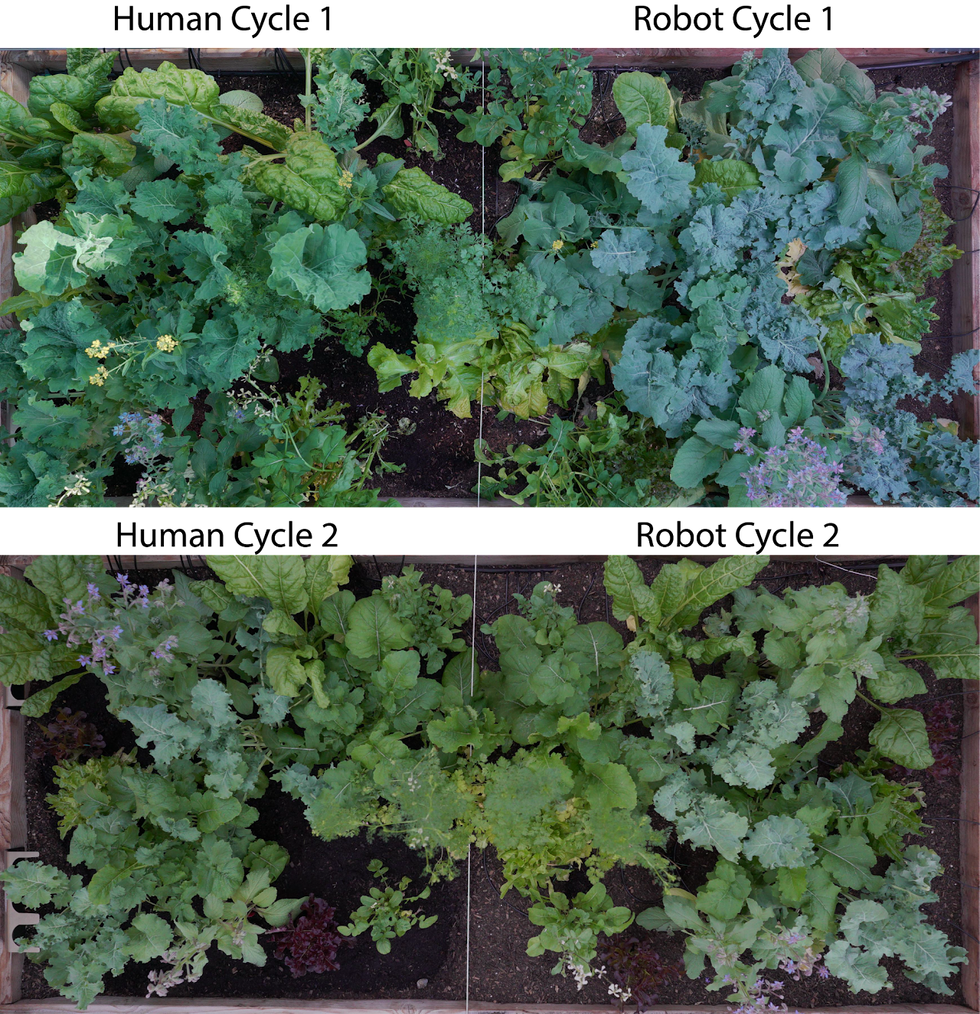

I love plants. I am not great with plants. I have accepted this fact and have therefore entrusted the lives of all of the plants in my care to robots. These aren’t fancy robots: they’re automated hydroponic systems that take care of water and nutrients and (fake) sunlight, and they do an amazing job. My plants are almost certainly happier this way, and therefore I don’t have to feel guilty about my hands-off approach. This is especially true that there is now data from roboticist at UC Berkeley to back up the assertion that robotic gardeners can do just as good of a job as even the best human gardeners can. In fact, in some metrics, the robots can do even better.
In 1950, Alan Turing considered the question “Can Machines Think?” and proposed a test based on comparing human vs. machine ability to answer questions. In this paper, we consider the question “Can Machines Garden?” based on comparing human vs. machine ability to tend a real polyculture garden.
UC Berkeley has a long history of robotic gardens, stretching back to at least the early 90s. And (as I have experienced) you can totally tend a garden with a robot. But the real question is this: Can you usefully tend a garden with a robot in a way that is as effective as a human tending that same garden? Time for some SCIENCE!
AlphaGarden is a combination of a commercial gantry robot farming system and UC Berkeley’s AlphaGardenSim, which tells the robot what to do to maximize plant health and growth. The system includes a high-resolution camera and soil moisture sensors for monitoring plant growth, and everything is (mostly) completely automated, from seed planting to drip irrigation to pruning. The garden itself is somewhat complicated, since it’s a polyculture garden (meaning of different plants). Polyculture farming mimics how plants grow in nature; its benefits include pest resilience, decreased fertilization needs, and improved soil health. But since different plants have different needs and grow in different ways at different rates, polyculture farming is more labor-intensive than monoculture, which is how most large-scale farming happens.
To test AlphaGarden’s performance, the UC Berkeley researchers planted two side-by-side farming plots with the same seeds at the same time. There were 32 plants in total, including kale, borage, swiss chard, mustard greens, turnips, arugula, green lettuce, cilantro, and red lettuce. Over the course of two months, AlphaGarden tended its plot full time, while professional horticulturalists tended the plot next door. Then, the experiment was repeated, except that AlphaGarden was allowed to stagger the seed planting to give slower-growing plants a head start. A human did have to help the robot out with pruning from time to time, but just to follow the robot’s directions when the pruning tool couldn’t quite do what it wanted to do.
 The robot and the professional human both achieved similar results in their garden plots.UC Berkeley
The robot and the professional human both achieved similar results in their garden plots.UC Berkeley
The results of these tests showed that the robot was able to keep up with the professional human in terms of both overall plant diversity and coverage. In other words, stuff grew just as well when tended by the robot as it did when tended by a professional human. The biggest difference is that the robot managed to keep up while using 44 percent less water: several hundred liters less over two months.
“AlphaGarden has thus passed the Turing Test for gardening,” the researchers say. They also say that “much remains to be done,” mostly by improving the AlphaGardenSim plant growth simulator to further optimize water use, although there are other variables to explore like artificial light sources. The future here is a little uncertain, though—the hardware is pretty expensive, and human labor is (relatively) cheap. Expert human knowledge is not cheap, of course. But for those of us who are very much non-experts, I could easily imagine mounting some cameras above my garden and installing some sensors and then just following the orders of the simulator about where and when and how much to water and prune. I’m always happy to donate my labor to a robot that knows what it’s doing better than I do.
“Can Machines Garden? Systematically Comparing the AlphaGarden vs. Professional Horticulturalists,” by Simeon Adebola, Rishi Parikh, Mark Presten, Satvik Sharma, Shrey Aeron, Ananth Rao, Sandeep Mukherjee, Tomson Qu, Christina Wistrom, Eugen Solowjow, and Ken Goldberg from UC Berkeley, will be presented at ICRA 2023 in London.
Reference: https://ift.tt/H3os2Ox
No comments:
Post a Comment